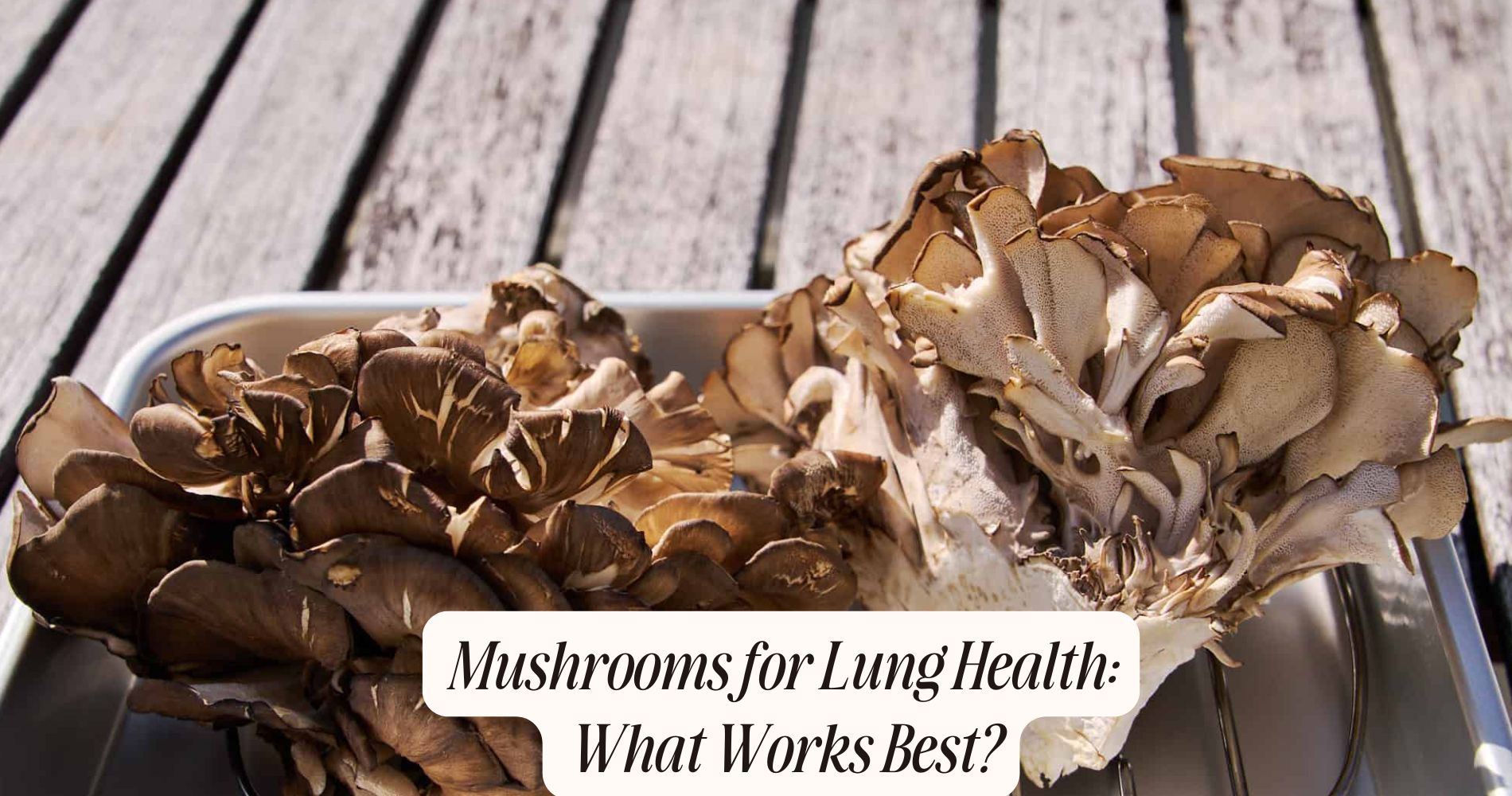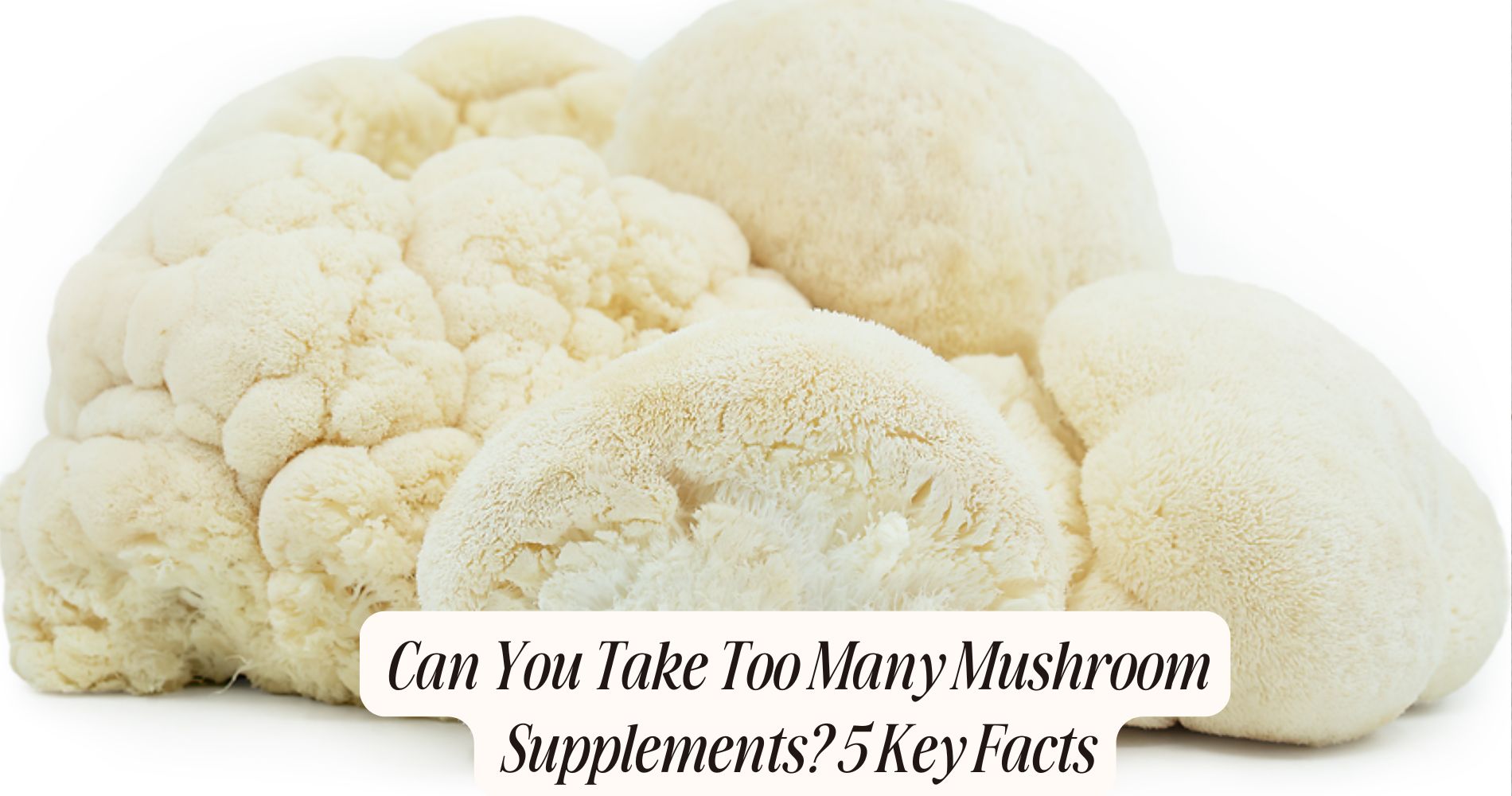
Mushrooms for Lung Health: What Works Best?
Health Benefits of Mushrooms
Mushrooms offer a wealth of health benefits due to their rich content of antioxidants, vitamins, and minerals. You'll find that their impressive nutritional value makes them a superb addition to your diet. For instance, mushrooms are low in calories but high in essential nutrients like selenium, copper, and various B vitamins. These elements play vital roles in maintaining cellular health and metabolic functions.
Additionally, mushrooms possess remarkable medicinal properties. They contain bioactive compounds such as beta-glucans, polysaccharides, and triterpenoids, which have been shown to enhance immune function. These compounds can help mitigate inflammation, a key factor in many chronic diseases, including those affecting the lungs.

By consuming mushrooms regularly, you can potentially bolster your immune system and improve overall respiratory health. Studies have demonstrated that certain mushrooms can even have antimicrobial and antiviral effects, which are particularly beneficial for lung health. In addition, the antioxidants found in mushrooms, such as ergothioneine and glutathione, help combat oxidative stress, reducing cellular damage and promoting lung tissue repair.
Incorporating mushrooms into your diet is a scientifically-backed way to leverage their nutritional value and medicinal properties for better health outcomes.
Reishi Mushrooms
You'll find that Reishi mushrooms offer significant support for your immune system, owing to their high levels of beta-glucans.
They exhibit strong anti-inflammatory properties, which can help reduce inflammation in your respiratory tract.
Additionally, Reishi mushrooms may enhance respiratory health by improving lung function and reducing symptoms of chronic respiratory conditions.
Immune System Support
Reishi mushrooms, scientifically known as Ganoderma lucidum, are renowned for their potent immune-boosting properties, making them an essential component in supporting lung health. These fungi are rich in bioactive compounds such as polysaccharides, triterpenoids, and peptidoglycans, all contributing to their impressive immune-modulatory capabilities. By enhancing the activity of your immune cells, particularly macrophages and natural killer cells, Reishi mushrooms help your body fend off respiratory infections and other lung-related ailments.
The immune-boosting effects of Reishi mushrooms are rooted in their remarkable fungal diversity. This diversity enables them to produce a wide range of secondary metabolites that work synergistically to fortify your immune system. Research has demonstrated that these compounds can stimulate cytokine production, which plays a vital role in orchestrating the body's immune response. Additionally, Reishi mushrooms help balance the immune system, ensuring it's neither overactive nor underactive, a significant factor in maintaining overall lung health.

Incorporating Reishi mushrooms into your diet or supplement regimen can be a strategic move to bolster your immune defenses. Their scientifically-backed benefits make them a valuable ally in the quest for peak lung health.
Anti-Inflammatory Properties
In addition to their immune-boosting properties, Reishi mushrooms exhibit powerful anti-inflammatory effects that can greatly benefit lung health. These mushrooms are rich in bioactive compounds like triterpenoids, polysaccharides, and peptidoglycans, which play vital roles in their anti-inflammatory mechanisms. By modulating the activity of various inflammatory pathways, Reishi mushrooms help reduce the secretion of pro-inflammatory cytokines, thereby mitigating inflammation in the lungs.
Among mushroom varieties, Reishi stands out due to its high concentration of these bioactive compounds. The triterpenoids in Reishi mushrooms specifically inhibit the production of nitric oxide and other inflammatory mediators, which are often elevated in lung diseases. Additionally, polysaccharides contribute to the downregulation of inflammatory gene expression, enhancing the overall anti-inflammatory response.
When you incorporate Reishi mushrooms into your diet, you're fundamentally providing your body with natural compounds that help maintain lung health by reducing chronic inflammation. This is particularly beneficial for individuals with conditions characterized by persistent inflammation, such as asthma or chronic obstructive pulmonary disease (COPD).
Respiratory Health Benefits
Many individuals seeking to enhance their respiratory health can benefit from the potent bioactive compounds found in Reishi mushrooms. Known scientifically as Ganoderma lucidum, Reishi mushrooms contain polysaccharides, triterpenoids, and other bioactive molecules that support lung function. These compounds have been shown to possess anti-inflammatory, antioxidant, and immunomodulatory properties.
When dealing with respiratory diseases such as asthma and chronic obstructive pulmonary disease (COPD), Reishi mushrooms can play a pivotal role. Studies have demonstrated that Reishi extract can reduce airway resistance and inflammation, improving overall lung function. By modulating the immune response, Reishi mushrooms help in reducing the hyper-reactivity of the airways, which is often a critical factor in respiratory diseases.
Additionally, the triterpenoids in Reishi mushrooms have been found to inhibit the release of histamines, thereby easing symptoms like wheezing and shortness of breath. These compounds also enhance oxygen utilization in the lungs, promoting better respiratory efficiency.
Cordyceps Mushrooms
Cordyceps mushrooms, known for their bioactive compounds, have shown promising benefits for improving lung function and overall respiratory health. These fungi contain cordycepin, a bioactive molecule that enhances oxygen utilization and increases ATP production, which boosts energy levels and reduces fatigue. This is particularly beneficial for individuals with respiratory issues like asthma or chronic obstructive pulmonary disease (COPD).
To maximize cordyceps benefits, you should consider the appropriate cordyceps dosage. Studies suggest that a daily dose ranging from 1,000 to 3,000 milligrams can yield significant improvements in respiratory function. This dosage helps improve lung capacity, reduces inflammation, and enhances overall respiratory efficiency. Always consult a healthcare provider before starting any supplementation to tailor the dosage to your specific needs.

Cordyceps also possesses anti-inflammatory and antioxidant properties. These attributes mitigate oxidative stress in lung tissues, promoting better lung health. Additionally, cordyceps boosts the activity of natural killer (NK) cells, strengthening your immune response against respiratory infections.
Chaga Mushrooms
Chaga mushrooms, rich in polysaccharides and antioxidants, offer significant benefits for lung health and respiratory function. These mushrooms contain betulinic acid, a compound known for its anti-inflammatory properties, which helps reduce inflammation in the respiratory system. The high antioxidant content in Chaga mushrooms neutralizes free radicals, protecting lung tissues from oxidative stress and damage.
One of the most accessible ways to enjoy Chaga mushroom benefits is through chaga tea preparation. To make chaga tea, you should first grind dried Chaga into a fine powder. Use about one to two teaspoons of this powder per cup of water. Boil the water, then reduce it to a simmer and add the Chaga powder. Let it simmer for at least 30 minutes, ensuring that the beneficial compounds are fully extracted. Strain the mixture before drinking.
Consistency is key for reaping the maximum benefits. Regular consumption of Chaga tea can help support your immune system, improve respiratory function, and enhance overall lung health. By integrating Chaga mushrooms into your daily routine, you can leverage their powerful properties to maintain ideal lung function and respiratory health.
Shiitake Mushrooms
Shiitake mushrooms, known for their rich content of polysaccharides and ergothioneine, can greatly enhance lung health by reducing inflammation and boosting immune response. The polysaccharides in shiitake, particularly beta-glucans, stimulate your immune system, helping your lungs fend off infections. Ergothioneine acts as a powerful antioxidant, protecting lung tissue from oxidative stress and damage.
One of the primary shiitake benefits is its anti-inflammatory properties. Chronic inflammation in the lungs can lead to conditions like asthma and chronic obstructive pulmonary disease (COPD). By incorporating shiitake mushrooms into your diet, you can help mitigate these inflammatory responses, promoting better respiratory health.

For practical use, consider integrating shiitake into your meals. Various shiitake recipes can make this easy and enjoyable. For instance, a shiitake and vegetable stir-fry not only adds flavor but also enhances your lung health. Another option is shiitake mushroom soup, which provides a warm, nourishing way to support your respiratory system, especially during cold seasons.
Maitake Mushrooms
Maitake mushrooms, often called 'hen of the woods,' are rich in beta-glucans and antioxidants that can greatly enhance lung health by boosting immune function and reducing inflammation. These compounds help your body fend off respiratory infections, which are often a precursor to more severe lung conditions. Beta-glucans are known for their ability to modulate the immune system, making your body more efficient at identifying and fighting off harmful pathogens.
One of the primary maitake benefits is its high concentration of D-fraction, a bioactive compound shown to stimulate immune cells like macrophages and T-cells. These cells play an essential role in defending your lungs against infections and promoting overall respiratory health. Additionally, the antioxidants in maitake mushrooms help neutralize free radicals, reducing oxidative stress, which is a key factor in chronic lung diseases such as COPD and asthma.
Maitake supplements offer a convenient way to incorporate these benefits into your daily routine, especially if fresh mushrooms aren't readily available. Look for standardized extracts to guarantee you're getting a consistent and potent dose of these beneficial compounds. Incorporating maitake mushrooms into your health regimen could be a valuable strategy for maintaining peak lung function and overall respiratory health.
Research and Findings
Recent studies highlight the potential benefits of various mushroom species in enhancing lung health and mitigating respiratory conditions. Researchers have discovered that specific mushrooms, such as Reishi and Cordyceps, positively impact lung function by reducing inflammation and oxidative stress. Clinical studies show that these mushrooms contain bioactive compounds like polysaccharides and triterpenoids, which are responsible for these beneficial effects.
For instance, one clinical study involving individuals with chronic asthma demonstrated that Reishi mushroom supplementation greatly improved lung function and reduced the frequency of asthma attacks. Another study on Cordyceps revealed its capacity to enhance oxygen utilization and pulmonary circulation, making it particularly beneficial for those with chronic obstructive pulmonary disease (COPD).
Furthermore, Shiitake mushrooms are noted for their immune-boosting properties, which can help prevent respiratory infections. These mushrooms contain lentinan, a compound proven to stimulate immune responses, thereby protecting lung tissue from harmful pathogens.
Frequently Asked Questions
Are There Any Side Effects of Consuming Mushrooms for Lung Health?
You might experience side effects from mushroom toxicity, including nausea or allergic reactions. However, moderate consumption generally offers respiratory benefits without severe issues. Always consult a healthcare professional before adding new mushrooms to your diet.
Can Mushrooms Interact With Medications?
Yes, mushrooms can interact with medications. Certain compounds in mushrooms might affect medication absorption, altering their effectiveness. Always consult your healthcare provider to verify that mushroom interactions won't interfere with your prescribed treatments.
How Should Mushrooms Be Stored to Maintain Their Potency?
To guarantee ideal storage and potency preservation, you should store mushrooms in a cool, dark place, ideally in a paper bag. Avoid airtight containers, as they trap moisture, diminishing their potency and shelf life.
Are There Any Mushrooms to Avoid for Lung Conditions?
You should avoid mushroom varieties like Amanita and false morels, as they contain toxins harmful to those with lung disease. These toxins can exacerbate symptoms and potentially lead to severe respiratory complications. Always consult your physician.
Can Children Safely Consume Mushrooms for Lung Health Benefits?
Children can safely consume certain mushroom varieties for lung health, but you must adjust children's dosage appropriately. Always consult a pediatrician to guarantee the chosen mushrooms and dosages are both safe and beneficial for your child.
Conclusion
Incorporating mushrooms into your diet can considerably boost lung health.
Reishi, cordyceps, chaga, shiitake, and maitake mushrooms each offer unique benefits, from enhancing respiratory function to providing powerful antioxidants.
Research continually supports their efficacy, making them a valuable addition to your wellness routine.
Embrace these fungi to breathe easier and enhance your overall health.




